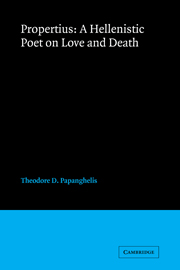Book contents
- Frontmatter
- Contents
- Preface
- Abbreviations
- 1 Introductory
- 2 nostris puer haesit ocellis: the lessons of 1.19
- 3 in amore mori: witches and lovers
- 4 in amore mori: the funeral
- 5 in amore mori: the shipwreck
- 6 in amore mori: crime passionnel
- 7 in amore mori: minor instances in Book 2
- 8 Strange beauty: a reading of 4.7
- 9 Concluding thoughts
- Bibliography
- Indexes
3 - in amore mori: witches and lovers
Published online by Cambridge University Press: 04 August 2010
- Frontmatter
- Contents
- Preface
- Abbreviations
- 1 Introductory
- 2 nostris puer haesit ocellis: the lessons of 1.19
- 3 in amore mori: witches and lovers
- 4 in amore mori: the funeral
- 5 in amore mori: the shipwreck
- 6 in amore mori: crime passionnel
- 7 in amore mori: minor instances in Book 2
- 8 Strange beauty: a reading of 4.7
- 9 Concluding thoughts
- Bibliography
- Indexes
Summary
Je t'apprendrai des choses terribles…des choses divines…tu sauras enfin ce que c'est que l'amour! Je te promets que tu descendras, avec moi, tout au fond du mystère de l'amour…et de la mort!…L'amour est une chose grave, triste et profonde…. L'Amour et la Mort, c'est la même chose…
Octave Mirbeau, Le Jardin des supplices, quoted in Praz (1951) 278Discussion of 2.1 has always centred upon the relationship between ll. 1–46 and 47–78: how does the rapturous troubadour of the first part stand to the gloomy lover of the second? Lefevre, keen as he is to look on the bright side, runs out of material by l. 47. Earlier critics found it quite reasonable to question the poem's unity, and the history of their ewilderment can be followed in Enk and Wimmel. Suffice it to say that out of the MSS' 78 lines, two or three poems or several fragments have been made. Arguments for unity have become more fashionable in recent years, although no two scholars are in complete agreement as to what brings it about. Enk, for instance, a repentant separatist, maintains that the incongruity between the delightful girl of the opening and the dura puella of the closing lines is meant to reflect Cynthia's fickleness in a manner that is programmatic for the whole book. Kroll had earlier argued along the same lines. A different line is taken by Wimmel. He views the second part as a captatio misericordiae calculated to counterbalance the arrogance and complacency of the first by rousing sympathy for the poet, mortally endangered because of his love life.
- Type
- Chapter
- Information
- Propertius: A Hellenistic Poet on Love and Death , pp. 20 - 49Publisher: Cambridge University PressPrint publication year: 1987
- 1
- Cited by



